The journey to Lugazi by road is ninety minutes eastward of Kampala. Cut that to forty-five minutes if you have a death wish! Or, worse—yup, there’s worse—if you crave a memorable encounter with a grumpy traffic officer! That fella will not only threaten you with an express penalty, but also indirectly present you an alternative way out. Your way out can range anywhere from squeezing as many bucks as possible out of your wallet to—oh, well, squeezing some more bucks out of your wallet! In Uganda, should you ever hear an officer tell you to ‘Talk like a man!’, may I be the first to inform you that this has absolutely nothing to do with the tone of your voice. Let’s just put it this way: your detainment or freedom are directly related to the depth of your pockets!
Anyway, I’m quite familiar with the Lugazi area and its landscape, having regularly plied this route decades ago on my way to and from boarding school. If you’ve heard of a place called Nowhere, that’s it! My primary school was situated right in the middle of Nowhere! Maybe that has since changed and it’s now located somewhere. I don’t know. I haven’t returned to that place in more than 20 years. But this is a story I might share sometime soon.
You’ll be arriving in Lugazi by the eastern artery which slices through this small town famed for it’s lush and scenic tea plantations that gracefully cascade down the hillsides. With the occasional sighting of harvesters working their fingers to the bone, the fields extend as far as the eye can see; vanishing off into the horizon. Tea is big business in Uganda and rakes in more than USD$100m in foreign earnings, annually. As to how much of that figure trickles to the peasants plucking the leaves all-day long in the sweltering heat down in Lugazi, is a whole other matter!

It’s a warm and sunny Friday morning in Kampala. At 11am, we’re ready to hit the road. I’m in the company of a few friends and we’re embarking on the journey to Lugazi to attend the funeral of a friend’s dad who has recently passed on. The farewell service starts at 1pm local time. We’re well within time. We make a brief stop at a gas station to fuel up and pick a snack. To save on time, the resolution is that we’ll have a decent meal on our way back.
The ceremony takes place all through the afternoon until 5pm when the final send-off happens. The plan is to get back on the road before dusk. At 5:20pm, we’re journeying back to Kampala. Before we exit Lugazi, though, our friend, Jose, whips out his phone to make what we later discover to be a call of great significance! Jose is a top Ugandan saxophonist and he’s about to blow us away: not with his tunes, but with some mouth-watering plot!
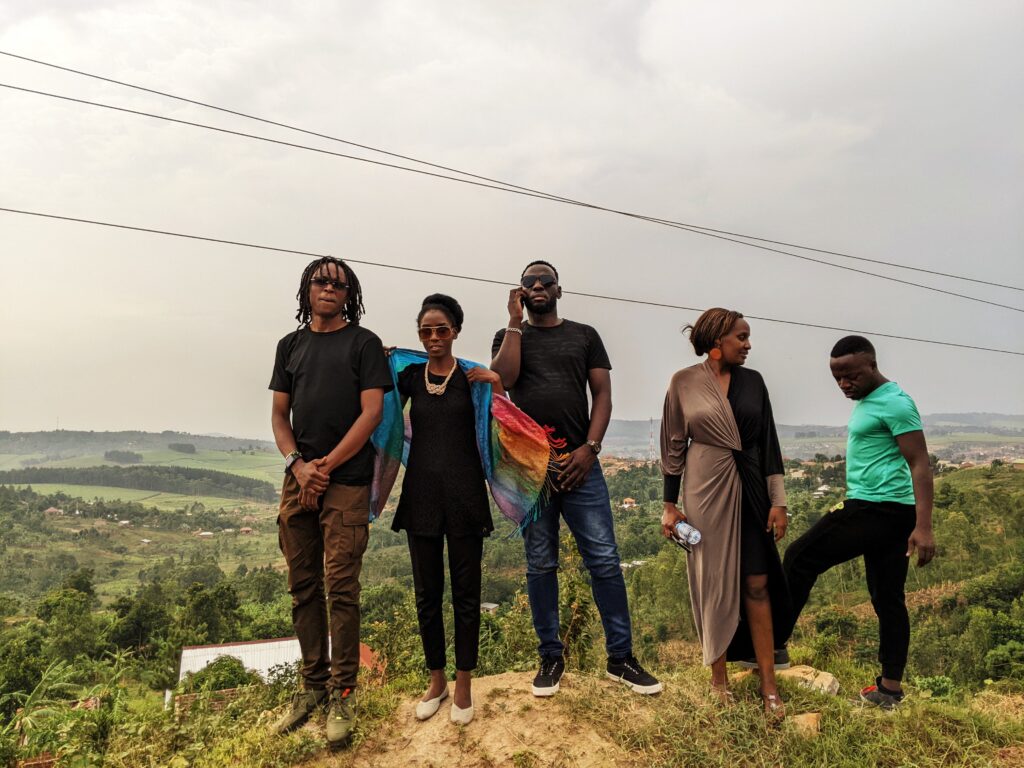
Apparently, on the other end of the call is a bloke stationed somewhere along the way to Kampala. This guy’s job is to take your order and prepare a table before you in the presence of your friends! And what will be on the table?—it’s said that nowhere in the southern hemisphere will you find chicken as fine, crispy, tender and rich in flavor as what’s soon to appear on this table! Not only do these birds school the KFC chicken, they even sponsor their studies!
Forty-five minutes later, we arrive at a place called Namawojjolo—the most prominent highway roast hub in Uganda. As we ease into the roadside parking space, a horde of chicken-wielding vendors descend on our car like a bunch of scavengers. Everyone’s brandishing their chicken which’s fastened onto wooden skewers. They’re all preaching the same meaty gospel and each one’s hoping that they’ll be the one that solely brings salvation to our empty tummies! There’s at least 20 people surrounding the car. Firmly gripped in their hands are a little more than two hundred pieces of oily chicken, gizzard and liver. Shortly, you’ll realize that it’s actually possible to have more grease on your car’s bodywork than in the engine compartment!
How it works here is more or less like a drive-through would. Except this is one heck of a chaotic drive-through! You pull over, the hawkers swarm, you buy whatever you like, hand your cash to the guy or lady that sold to you—hopefully you remember their face—and then off you go. Our case is somewhat different cos we placed our orders prior and we’ll be dining on location. Without delay, we ward off the vendors so we can peacefully stroll to the VIP section! Or is it?
As soon as you swing the door open and hop out of the enclosure of the car, the first thing that hits you is a heavy aromatic wave of roast wafting through the air. In no time, your brain dispatches a memo to the oral juices alerting them to prepare for deployment at the frontline. The regiment down in your belly is on standby too—ready for battle! You’ve just fallen into these local rotisseurs’ merciless trap! But first, we need to locate our chef! Where we are right now is what the locals call the supermarket. Sort of like the main operations area. The kitchen is a fairly large windowless, low-rise concrete structure with iron-sheet roofing to protect against the elements. Each individual has got a compartment and charcoal stove from where they carry out their business, even though it’s not uncommon to find many of them sharing spaces.
Detached twenty meters away is a smaller structure of similar architectural layout, still by the roadside. This one’s got the name maroon market, and that’s obviously because the building and the costumes that everyone’s wearing are all maroon. This place is where our chef is based and is waiting for us from.
On spotting us, his face lights up like a 100-watt bulb. Clearly, he’s glad to have customers this many forsake the other vendors and come to him all at once. He’s wearing a pair of kaki trousers and a brown shirt with strange patches. He ushers us into a small room. There are some plastic seats and a long table prepared. We’ll sit and wait for the arrival of our orders. In the meantime, there’s a couple of finely-roasted chicken liver starters making rounds. No better way to launch into this fest!
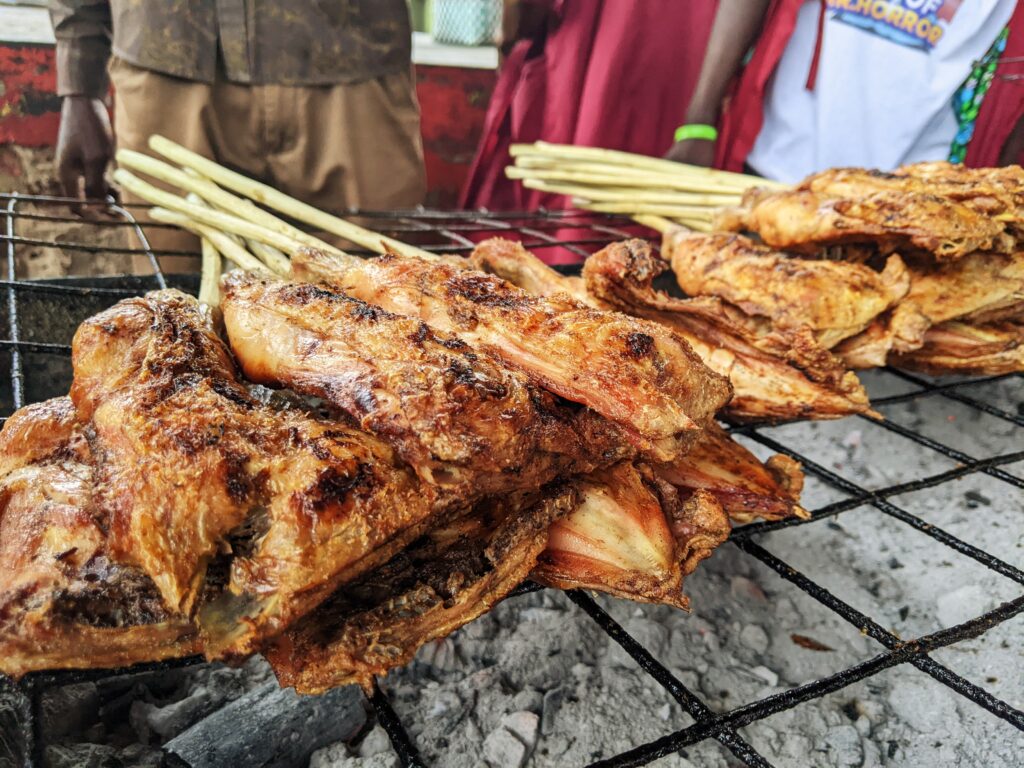
In less than 10 minutes, it’s finally time for the main course, and we waste no time showing these chicken thighs and wings who’s boss! We mean business and didn’t come this far to play games. The proof of this is in the pudding as we vigorously chomp away on the birds, with little to spare. We’re tantalisingly close to devouring the bones when my conscience suddenly reawakens. This is the point that I call my mates to attention and present to them a fundamental question: guys, if we munch the bones, what will the dogs eat? Right then, thanks to my compassion, the general consensus is that the animals will be joining in the party as well. But only after we’re done!
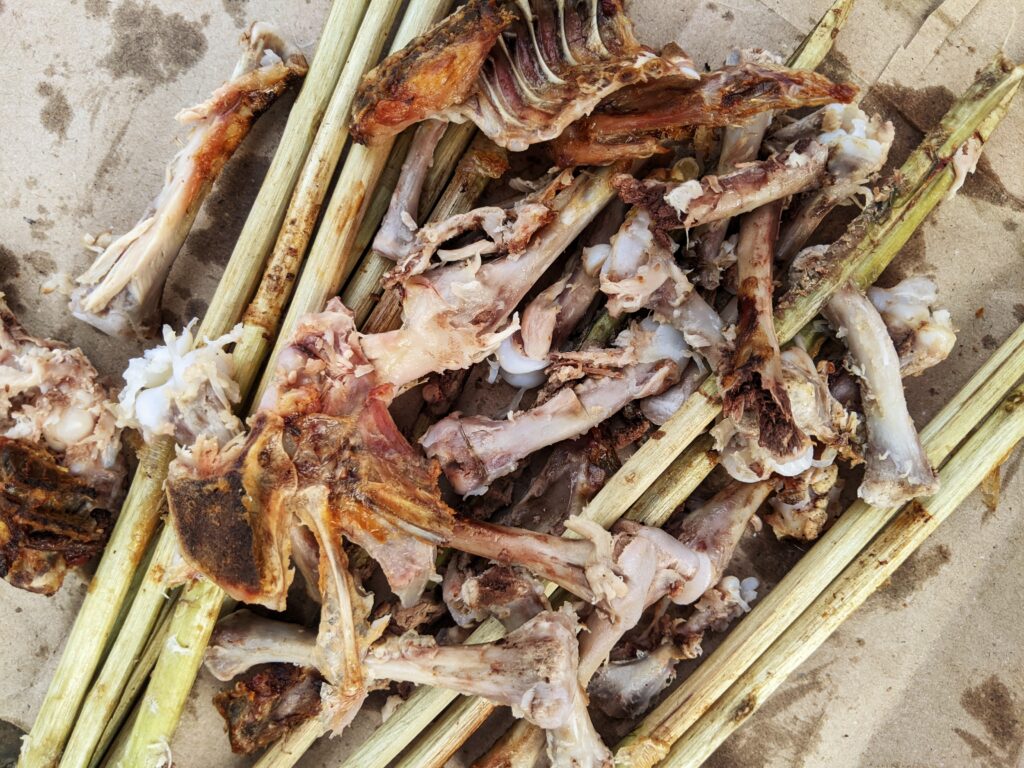
I need to have a chat with the chef to establish what his secret is cos, not only is his roast tasteful, he seems quite popular in this place. Despite his clearly busy evening, Ramathan is generous enough to grant me a couple of moments for a conversation. Ramathan Batambuze is his full name. His lean build is a bit deceptive and could trick you into thinking you’re hanging with someone in your age bracket. On the contrary, the man has been around for some four decades.
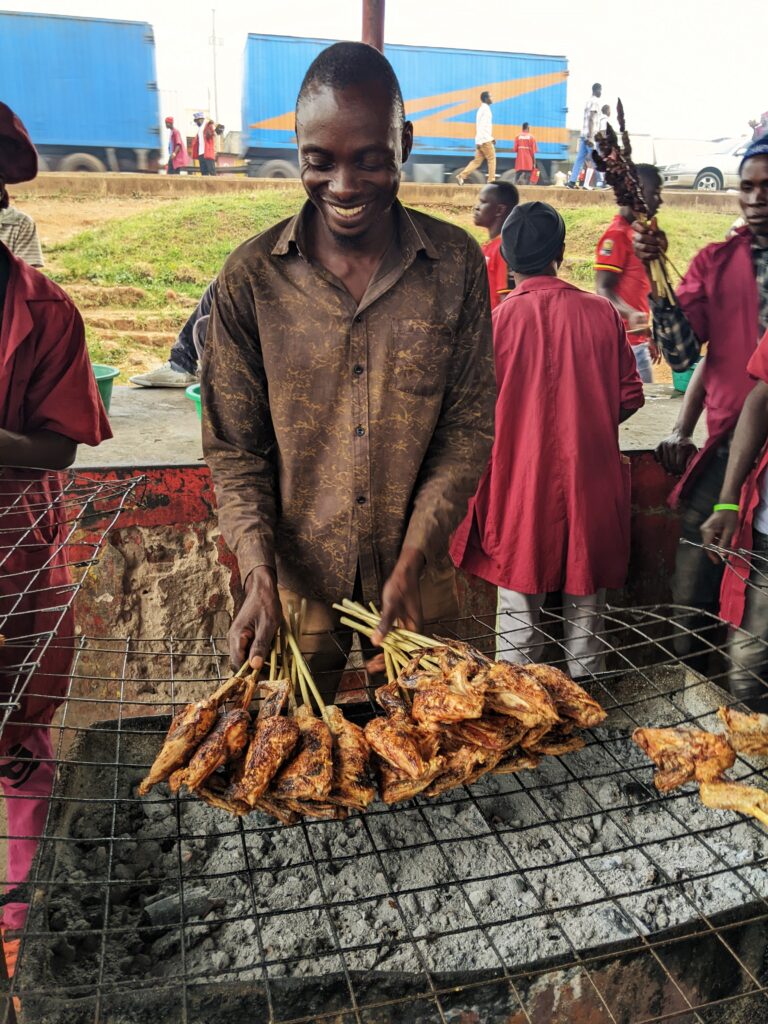
After consenting to this impromptu chat, Ramathan, a father of ten–we’ll return to this later–is quick to announce to me his favorite clients. He isn’t shy to brag that some of the Ugandan celebrities like Jose Chameleon, Irene Ntale, and now, myself and the crew, are some of his top clients. Ramathan goes ahead to say that just like we did, they too usually ring him up beforehand. There’s a bit of proof to this as our conversation is regularly punctuated by a phone call. His phone literally rings every few minutes. On the matter of recipes, the secret to the Namawojjolo chicken’s taste is–wait for it!–there’s no secret! Just a few sprinkles of salt and that’s it. Unless, of course, there’s some witchcraft-related ingredient thrown in while we’re not watching!
Ramathan’s journey didn’t start here. It did far away in a small fishing village called Nankoma, 120km east of Kampala, in Mayuge district. He was raised by a devout Christian mother and a Muslim dad. Unfortunately, like it is with many in the rural areas, his secondary school studies came to a screeching stop in Form-2 after his father died. And more often than not, cases such as this end up in child marriages. It wasn’t any different for Ramathan, cos at the age of 17, in 1997, he had his first daughter. He seemed to take God’s instruction on filling up the earth quite seriously! It might explain why between then and now, he churned out nine more. In total: four boys, six girls! Say all you want, but in a couple of years we might have Ramathan FC!
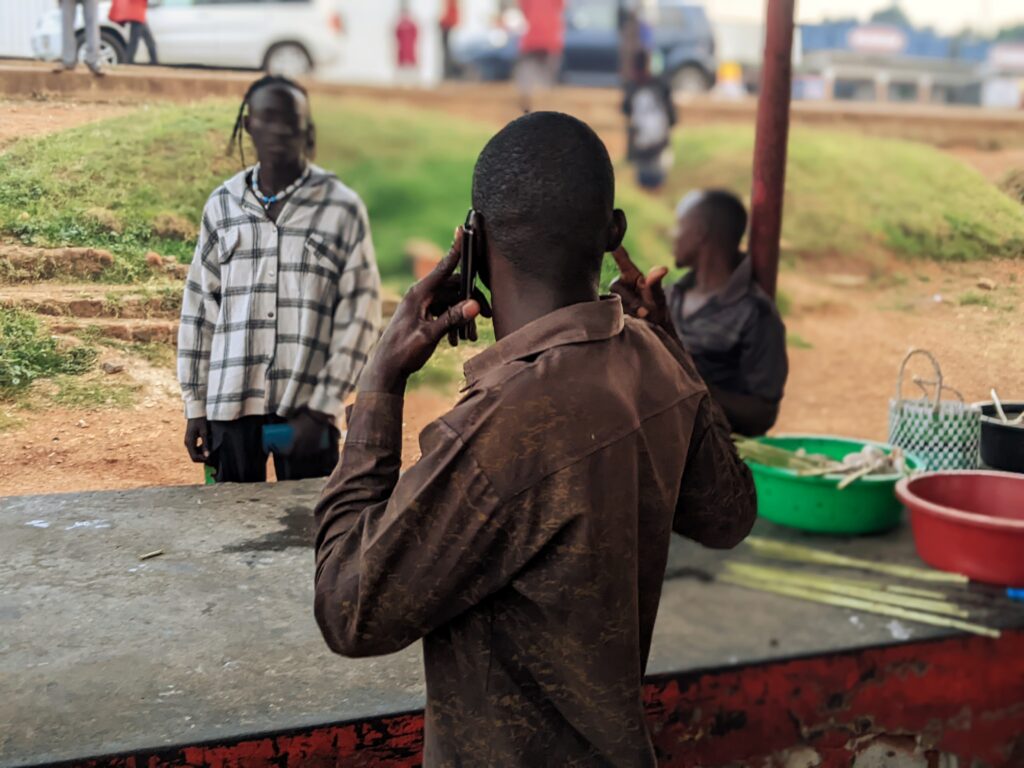
As a young father, Ramathan took to fishing to fend for his swelling family. He was at it for more than 8 years and made some decent buck. At least enough to raise some of his kids. Two of his girls currently live and work in Kampala. His fishing days didn’t go any farther as a result of what he describes as ‘soldiers’ whipping and driving them off the lake. The exact circumstances under which this occurred are difficult to verify. But it should apparently explain why he abandoned the trade, which he later confesses brought in a lot more money than what he’s currently doing.
In February 2004, Yusuf, his brother and a resident of Arua, on the other side of the Nile, introduced him to the art of roasting chicken. He has since not looked back. It goes without saying, though, that, like it was for many businesses, the two-year long lockdown wrecked great havoc on these vendors. And, so, while Ramathan seems to be picking up the pieces fairly okay, his colleagues still struggle to recover.
We’re momentarily interrupted by the appearance of a lady who seems to have a knack for participating in conversations whose origins she doesn’t know. That’s okay. Her name is Akiiki, originally from Fort Portal, in Kabarole district, Western Uganda.
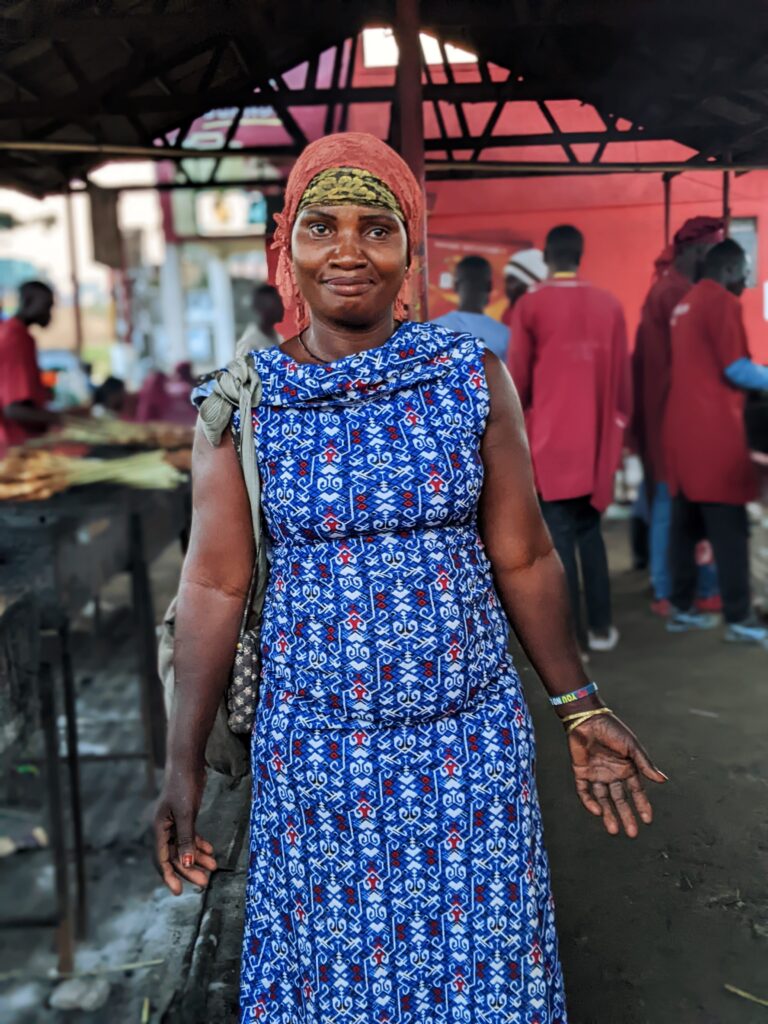
Akiiki’s story is that she plays a vitally important role in this place cos, without her, you would have no way to hold your roast. According to her, she makes and supplies all the skewers that are used in the market! I’m not particularly confident in the truthfulness of her tale, but like the resurrected LORD, Akiiki swiftly stretches out her palms for me to examine the skewer-inflicted scars, with the hope that this will dispel my lingering doubts.
It’s slightly after 7pm. Akiiki’s in a hurry to make a delivery, but doesn’t mind a photo moment. Before she leaves, she’s curious to know if there might be any work opportunities for her in Kampala. She’s been making the skewers for a whooping 20 years and is at the end of her tether! Akiiki insists that we take down her number in case something comes up.
Ramathan, on the other hand, received an order for 280 pieces of chicken not far back. I’m guessing it’s one of those calls that came in while we chatted earlier. Only wings and thighs are required. That’s 70 birds! The client needs the consignment ready by 7am the following morning. The live birds have just arrived and are locked away in a chicken pen a few meters away. The chef steps aside to have a discussion with a young lad that has been assigned the bloody task of slitting 70 throats in a single night. With his team ready, the chicken will hit the fire starting 3am! This is our cue to get out of there and let the men get on with their work. At approximately 7:25pm, we left Namawojjolo without the shadow of a doubt that the reason the chicken crossed the road was to escape eternal damnation at the unforgiving hands of Ramathan and his fiery stove!
Follow the conversation on X:
I love it so much that you get to share the stories of people that most people never care to take time and listen to.We are surrounded by so many people whose struggles we’ve never cared to find out…we all have different experiences in life and just getting someone interested in understanding yo story makes adifference.Please whoever passes Namawojolo let’s support Ramathan and let’s help Akiiki find another job..20yrs of making skewers and scars on her hands…its disturbing.
Angela, you may want to taste his chicken, yourself, before you recommend! 😊
Hehe, I have munched the great story on my way back to Lugazi just now- you are a great writer!
👍 I hope you got yourself a chicken thigh along the way!
This is very interesting 😄,
Thanks to you!!
The way Em praises how sweet the starter was…. that’s actually how many rounds of these starters you would take. Just a lil’ caution though, these bu small things will finish all your transport money. . 😂
Correct! All your money gone just like that!
This is a good read. Reading through, I vividly reminisce the roadside chicken wings along the popular Forest road (in Jos), the oily thighs along Abuja road (in Keffi) here in North-Central Nigeria; and the meaty gospel the sellers preach to potential buyers like me. They go as far as promising long life and prosperity if you eat their roasts. Of course you’d have to remove some bucks and buy first. As a long life enthusiast, I always listen to these meaty gospels.
Michael, plz don’t tempt me into coming to Nigeria just to listen to the gospel according to Forest road! Don’t do this!
Wow…280 sticks?!! Talk about brisk bizness. None beats Namawojolo😉
Dave, yeh! 280! And each stick goes for 6k. If I remember well, he may have mentioned that the client was a nearby school. Seeta High or something.
This is a very awesome piece 👏🌟
Thanks Deborah! And thanks for reading!